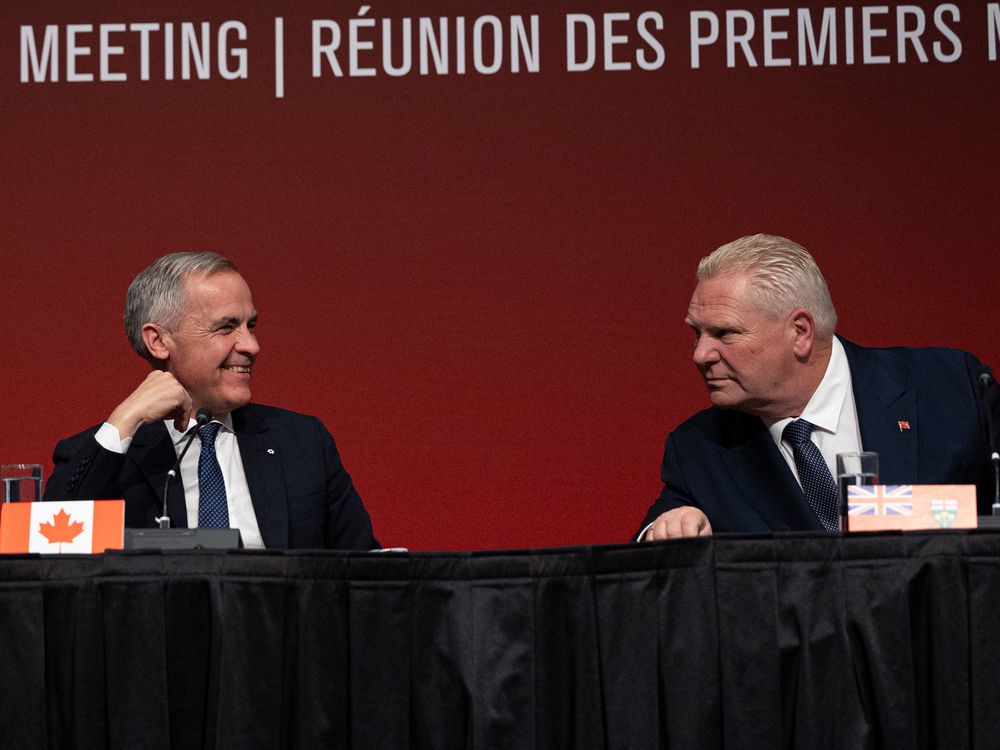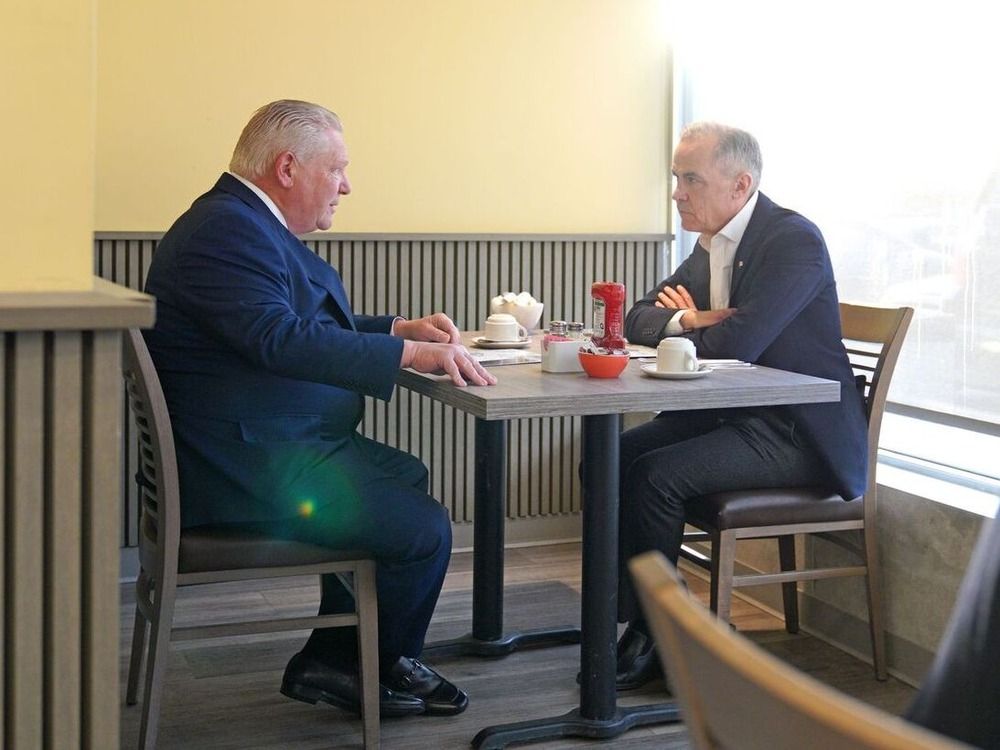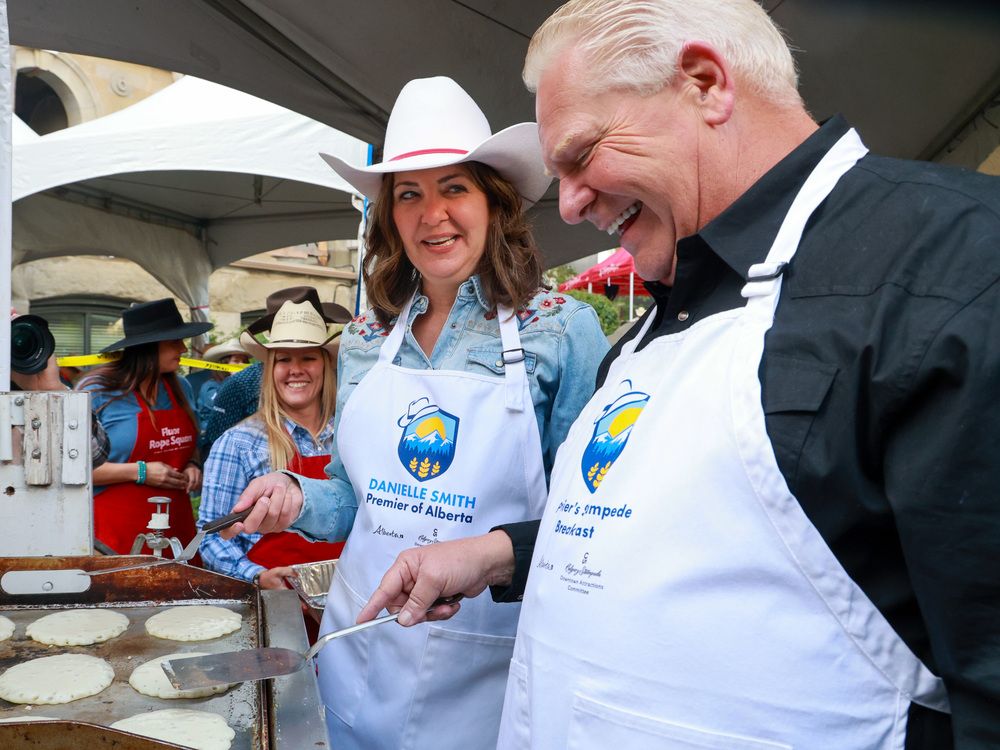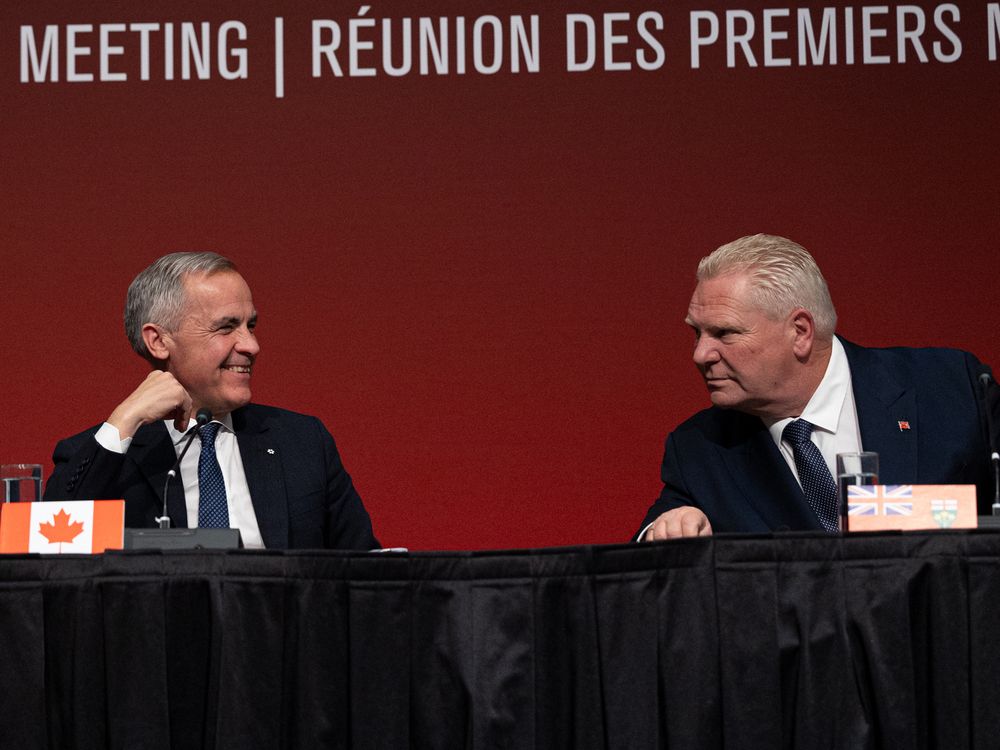
Ontario Premier Doug Ford is hosting Canada’s premiers in Muskoka starting Monday at a Council of the Federation summer gathering. Premiers of the 13 provinces and territories can look forward to enjoying Alberta-bred and Ontario-fed beef on the grill at the Ford family cottage. They will have a special guest: Prime Minister Mark Carney.
“For the first time ever that I can remember,” Ford says, “the prime minister is invited. That would have never happened with Trudeau, but it’s happening under Mark Carney. And he’s going to be welcomed with open arms.”
Rather than the premiers getting together “to bitch and complain about the federal government,” Ford chuckles, “we get to present it right to him (Carney) as he’s sitting around the dinner table and we’re talking to him.”
“The access is phenomenal,” Ford says of his own relationship with the PM, “I’ll message him, he gets right back to me. It’s all about communication and relationship-building.
“And, he’s a very, very great business person,” Ontario’s premier enthuses, listing off Carney’s credentials (without a mention of potential conflicts of interest).
“He gets it,” Ford says. “He’s going to go in there and he’s going to clean house in Ottawa, which is well overdue.”

Figuring out how Team Canada will respond to U.S. President Donald Trump’s declaration of a blanket 35 per cent tariff on goods imported from Canada as of Aug. 1 — on top of previously implemented tariffs on auto parts, steel, aluminum and copper — will no doubt be the premiers’ top priority in cottage country next week.
“Elbows up or elbows down? What’s the strategy, now?” I ask Ford in a recent call.
“We have to negotiate through strength,” Ford responds, “and we really have to flex our muscles and make sure President Trump hears us.”
“Because in closed-door meetings and in our phone calls with governors — and they pull a lot of weight, I heard that from (U.S. Commerce Secretary Howard) Lutnick — Republicans don’t want this,” Ford reports
“Democrats obviously don’t want this, and Republicans don’t want it. But they’re terrified to say anything publicly,” he says. Only a few U.S. senators have spoken up, Ford adds, “and God bless them.”
Carney is advancing several strategies — promoting free trade within Canada; negotiating a security and trade pact with America, in good faith; and at the same time, forging strategic partnerships with the EU to beef up security and defence alliances and boost trade and economic security. This week, Carney announced measures to protect the nation’s steel industry, including guarding against foreign steel entering Canada to bypass Trump’s tariffs.
Breaking down trade barriers between provinces is a strategy Ontario has embraced; the province has signed memorandums of understanding with all provinces except Quebec, B.C. and Newfoundland.
And Ford sees other cards to be played, other ways to pressure the Trump administration for a fair trade deal.
“I’ve been very transparent with Secretary Lutnick, we’re going to start on-shoring everything,” Ford says. “We’re going to on-shore the steel beams, the I-beams. We have more cranes in the sky in Toronto and the GTA than their top 10 cities combined.”
“We’re going to on-shore the aluminum cans, the beer cans … to make sure we don’t have to see a tariff of 25 per cent on the aluminum going down (to the U.S.), they convert it, print it, and send it back up (to Canada) with another 25 per cent; that’s 50 per cent.”
Ford’s government is giving incentives to companies — to turn aluminum into cans, produce steel I-beams, and manufacture steel rails used in transit projects. This strategy tracks with Carney’s recent commitment to rely more on Canadian steel for Canadian projects.
“Canada buys more off the U.S. than China, than Japan, than Korea, U.K. and France combined,” Ford elaborates. “We’re their largest customer, and yes, they’re our largest customer. But Ontario alone employs nine million Americans who wake up every morning to build a widget or provide a service to Ontario alone.”
“(Americans) are going to feel the pressure,” Ford says. “They’re going to feel the pressure when Americans start losing their jobs because we’re going to start on-shoring everything, and once that happens, I told Lutnick, it’s hard to turn that tap off.”
And, Ford continues, Canada can leverage its supplies of critical resources. American governors, both Republicans and Democrats, tell Ford the same thing: “There are two things they’re interested in: our nuclear energy and our critical minerals.”
Repeating his well-worn adage — “Canada is not the threat; China is the real threat” — Ford explains how China’s lock on 90 per cent of the world’s critical minerals makes Ontario’s resources in the Ring of Fire all the more essential to Americans.
“And we don’t believe in rip and ship,” Ford assures me, “we’re going to make sure that we mine it with Ontario workers, we’re going to refine it here in Ontario with Ontario workers, and then we’ll have the option of shipping it around the world.” Ford’s also pitching a deep sea port to facilitate exports, in a couple of locations — one in Ontario, in Hudson’s Bay, and one in Manitoba.
“It will wake up President Trump real quick,” Ford quips, “if we start shipping it to our other allies around the world and not to him.”
Ford is the premier of Ontario — it’s his job to look out for that province’s interests — but there’s no question he’s fully steeped in Team Canada spirits. “We all have something that we’re bringing to the table,” he assures me, repeatedly.
“The U.S. needs our high-grade nickel,” Ford asserts, “to be used in the military, in aerospace, in manufacturing. It’s no different from the aluminum, from Quebec, being shipped down there, or the potash or uranium from Saskatchewan, and obviously, the 4.3 million barrels of oil we ship down to the U.S. But we’re going to diversify that and not rely on the U.S. Yes, we have one pipeline going west, but we need another one going west, east, north and south.”

Ford is also effusive about the need to get rid of the tanker ban on the West Coast and revamp the impact assessment act. “Those days are done. They’re gone,” he says. “We have to start moving forward and create the conditions for the rest of the world to look at investing in not just Ontario but other jurisdictions across Canada, from coast to coast to coast.”
I moved from Ontario to Alberta in the early 1980s — a time when Alberta premier Peter Lougheed was struggling with prime minister Pierre Elliott Trudeau’s National Energy Program — and can still recall the bitter disappointment of Ontario premier Bill Davis’s unwillingness to support Alberta’s interests.
I admit to being impressed by Ford’s visit to the recently concluded Calgary Stampede, and not just by his commitment to flip pancakes alongside Smith, whose griddle experience is legendary. Ontario’s premier also inked two MOUs with Alberta, to advance freer trade between the provinces and publicly endorse mutually beneficial national-interest projects, including an oil pipeline from Alberta to Ontario (fabricated with Ontario steel).
Although Ford’s not sure if Carney will be specific about the nation-building projects selected to move forward, in the upcoming discussions around the table in Muskoka, he’s optimistic provincial leaders — and their constituents — recognize this unique opportunity to move forward on national infrastructure projects.
“We’re moving forward and we’re going to see another $200 billion going into our economy, increase our GDP anywhere upwards to six per cent,” Ford says.
He expects his fellow premiers will have to hop on this train. “The residents of each province are going to demand that they get on that train as we’re moving forward,” he says, “because they want to prosper as well.”
National Post
Our website is the place for the latest breaking news, exclusive scoops, longreads and provocative commentary. Please bookmark nationalpost.com and sign up for our daily newsletter, Posted, here.
